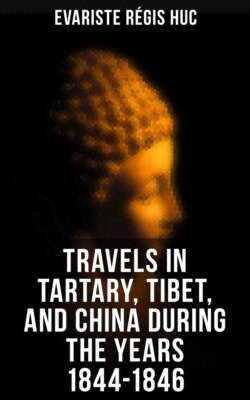Travels in Tartary, Tibet, and China During the Years 1844-1846

Реклама. ООО «ЛитРес», ИНН: 7719571260.
Оглавление
Evariste Régis Huc. Travels in Tartary, Tibet, and China During the Years 1844-1846
Travels in Tartary, Tibet, and China During the Years 1844-1846
Table of Contents
Volume 1
PREFACE
CHAPTER I
CHAPTER II
CHAPTER III
CHAPTER IV
CHAPTER V
CHAPTER VI
CHAPTER VII
CHAPTER VIII
CHAPTER IX
CHAPTER X
CHAPTER XI
OF THE MINORITES WHO DWELL IN THIS COUNTRY OF CATHAY (CHINA)
OF CERTAIN NESTORIAN CHRISTIAN SCHISMATICS WHO DWELL THERE
OF THE EXTRAORDINARY FAVOUR WHICH THE GRAND KHAN SHOWS TO THE SAID CHRISTIANS
CHAPTER XII
NOTES
Volume 2
CHAPTER I
CHAPTER II
CHAPTER III
CHAPTER IV
CHAPTER V
CHAPTER VI
CHAPTER VII
CHAPTER VIII
CHAPTER IX
POSTSCRIPT
NOTES
Отрывок из книги
Evariste Régis Huc
Published by
.....
It was near noon before the ground, beginning to slope, intimated that we approached the termination of the plateau. We then descended rapidly into a deep valley, where we found a small Mongolian encampment, which we passed without pausing, and set up our tent for the night on the margin of a pool further on. We were now in the kingdom of Gechekten, an undulating country, well watered, with abundance of fuel and pasturage, but desolated by bands of robbers. The Chinese, who have long since taken possession of it, have rendered it a sort of general refuge for malefactors; so that “man of Gechekten” has become a synonyme for a person without fear of God or man, who will commit any murder, and shrink from no crime. It would seem as though, in this country, nature resented the encroachments of man upon her rights. Wherever the plough has passed, the soil has become poor, arid, and sandy, producing nothing but oats, which constitute the food of the people. In the whole district there is but one trading town, which the Mongols call Altan-Somé, (Temple of Gold). This was at first a great Lamasery, containing nearly 2000 Lamas. By degrees Chinese have settled there, in order to traffic with the Tartars. In 1843, when we had occasion to visit this place, it had already acquired the importance of a town. A highway, commencing at Altan-Somé, proceeds towards the north, and after traversing the country of the Khalkhas, the river Keroulan, and the Khinggan mountains, reaches Nertechink, a town of Siberia.
The sun had just set, and we were occupied inside the tent boiling our tea, when Arsalan warned us, by his barking, of the approach of some stranger. We soon heard the trot of a horse, and presently a mounted Tartar appeared at the door. “Mendou,” he exclaimed, by way of respectful salutation to the supposed Lamas, raising his joined hands at the same time to his forehead. When we invited him to drink a cup of tea with us, he fastened his horse to one of the tent-pegs, and seated himself by the hearth. “Sirs Lamas,” said he, “under what quarter of the heavens were you born?” “We are from the western heaven; and you, whence come you?” “My poor abode is towards the north, at the end of the valley you see there on our right.” “Your country is a fine country.” The Mongol shook his head sadly, and made no reply. “Brother,” we proceeded, after a moment’s silence, “the Land of Grass is still very extensive in the kingdom of Gechekten. Would it not be better to cultivate your plains? What good are these bare lands to you? Would not fine crops of corn be preferable to mere grass?” He replied, with a tone of deep and settled conviction, “We Mongols are formed for living in tents, and pasturing cattle. So long as we kept to that in the kingdom of Gechekten, we were rich and happy. Now, ever since the Mongols have set themselves to cultivating the land, and building houses, they have become poor. The Kitats (Chinese) have taken possession of the country; flocks, herds, lands, houses, all have passed into their hands. There remain to us only a few prairies, on which still live, under their tents, such of the Mongols as have not been forced by utter destitution to emigrate to other lands.” “But if the Chinese are so baneful to you, why did you let them penetrate into your country?” “Your words are the words of truth, Sirs Lamas; but you are aware that the Mongols are men of simple hearts. We took pity on these wicked Kitats, who came to us weeping, to solicit our charity. We allowed them, through pure compassion, to cultivate a few patches of land. The Mongols insensibly followed their example, and abandoned the nomadic life. They drank the wine of the Kitats, and smoked their tobacco, on credit; they bought their manufactures on credit at double the real value. When the day of payment came there was no money ready, and the Mongols had to yield, to the violence of their creditors, houses, lands, flocks, everything.” “But could you not seek justice from the tribunals?” “Justice from the tribunals! Oh, that is out of the question. The Kitats are skilful to talk and to lie. It is impossible for a Mongol to gain a suit against a Kitat. Sirs Lamas, the kingdom of Gechekten is undone!” So saying, the poor Mongol rose, bowed, mounted his horse, and rapidly disappeared in the desert.
.....